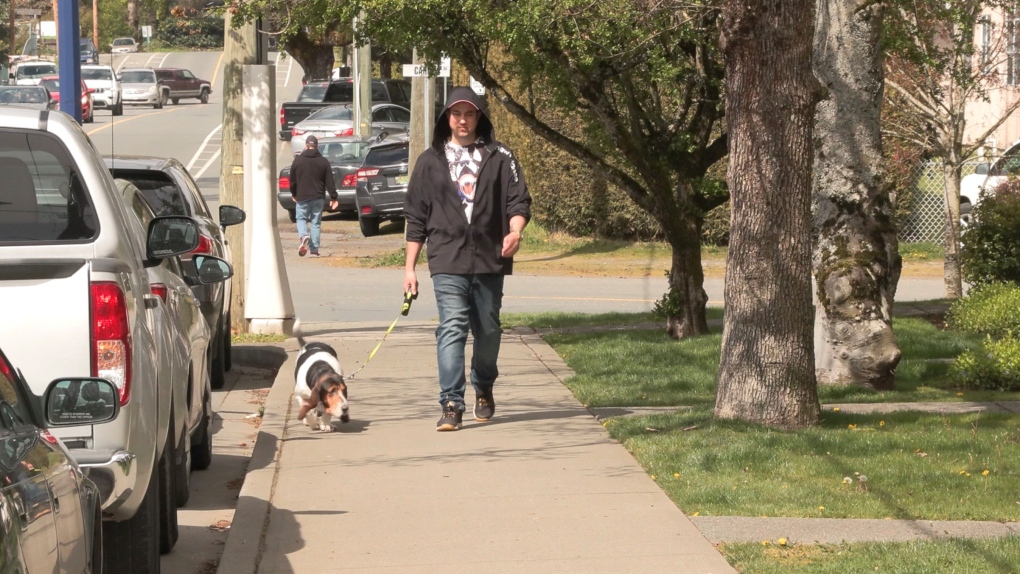'Priced itself out of the retirement market': Realtors weigh in on changing age of Vancouver Island residents
Vancouver Island has long been known as a place where people come to retire, but a new report shows that is no longer the case. The island’s immigration is now being fuelled by young, working families.
Jlo Magneto and his young family recently moved to Langford from just outside of Toronto. According to a new report from the Vancouver Island Economic Alliance, the young family fits perfectly into the changing demographics of the island’s newcomers.
"I lived here back in my college days and I loved it out here," said Magneto. "I always wanted to come back so when I saw an opportunity to come, I definitely pursued it."
Megneto is in the Canadian Armed Forces and his wife is a nurse. The jump was expensive, but manageable.
"It all did work out," said Magneto. "We sold for over double our asking price back home before moving out here, so that was our only saving grace for finding a place out here."
The economic alliance report found that between 2014 and 2021, 89,000 people moved to Vancouver Island.
Some 46,400 of those people came here from other parts of the province, while 37,200 came from other parts of the country.
"Well there’s been a lot of non-retirees moving here," said Tony Joe, broker and owner of Re/Max Properties.
 Jlo Magneto is pictured walking with his dog in Langford B.C. (CTV News)
Jlo Magneto is pictured walking with his dog in Langford B.C. (CTV News)
The report also found that the percentage of people over the age of 50 coming to the island declined from 59 per cent of all migrants to 35 per cent.
"Victoria has really priced itself out of the retirement market," said Joe.
HOUSING PRICES
Joe says, with the average price for a single family detached home now selling for $1.48-million in the Capital Region, young working people are the only ones that can now afford to move here.
"Victoria is too expensive now," said Joe. "That’s one of the reasons why we’re seeing a lot more activity in the Cowichan Valley, in the Comox Valley."
The Capital Region saw the most growth with 45,800 newcomers. Nanaimo came in second place with 18,800, followed but the Comox Valley and the Cowichan Valley.
"What we’re really looking at is a demand problem," said Charlie DePape, realtor with Royal LePage Realty.
"The demand is huge and supply is a little thin, that’s keeping prices high."
Low inventory in more popular areas of the island means prices for housing are going up everywhere.
Nanaimo recently conducted its own study finding 25 to 44-year-olds are expected to be the fastest growing age group over the next decade. The cohort will overtake seniors, who have historically held that spot.
"Coming from North Vancouver, that was the reason we moved over in the first place is because we could afford to buy something," said one woman in Nanaimo who just moved to the island from the mainland.
With a strong economy and a good infrastructure that allows for remote work, many more families could be looking to relocate to the island.
But, with housing being in short supply and prices so high, the young newcomers may have to push back their own retirement just to stay here.
CTVNews.ca Top Stories

Prime Minister Trudeau meets Donald Trump at Mar-a-Lago
Prime Minister Justin Trudeau landed in West Palm Beach, Fla., on Friday evening to meet with U.S.-president elect Donald Trump at Mar-a-Lago, sources confirm to CTV News.
'Mayday! Mayday! Mayday!': Details emerge in Boeing 737 incident at Montreal airport
New details suggest that there were communication issues between the pilots of a charter flight and the control tower at Montreal's Mirabel airport when a Boeing 737 made an emergency landing on Wednesday.
Hit man offered $100,000 to kill Montreal crime reporter covering his trial
Political leaders and press freedom groups on Friday were left shell-shocked after Montreal news outlet La Presse revealed that a hit man had offered $100,000 to have one of its crime reporters assassinated.
Questrade lays off undisclosed number of employees
Questrade Financial Group Inc. says it has laid off an undisclosed number of employees to better fit its business strategy.
Cucumbers sold in Ontario, other provinces recalled over possible salmonella contamination
A U.S. company is recalling cucumbers sold in Ontario and other Canadian provinces due to possible salmonella contamination.
Billboard apologizes to Taylor Swift for video snafu
Billboard put together a video of some of Swift's achievements and used a clip from Kanye West's music video for the song 'Famous.'
Musk joins Trump and family for Thanksgiving at Mar-a-Lago
Elon Musk had a seat at the family table for Thanksgiving dinner at Mar-a-Lago, joining President-elect Donald Trump, Melania Trump and their 18-year-old son.
John Herdman resigns as head coach of Toronto FC
John Herdman, embroiled in the drone-spying scandal that has dogged Canada Soccer, has resigned as coach of Toronto FC.
Weekend weather: Parts of Canada could see up to 50 centimetres of snow, wind chills of -40
Winter is less than a month away, but parts of Canada are already projected to see winter-like weather.

































